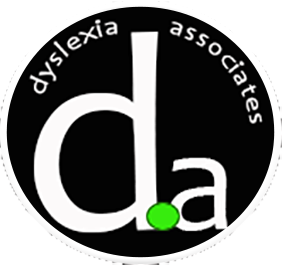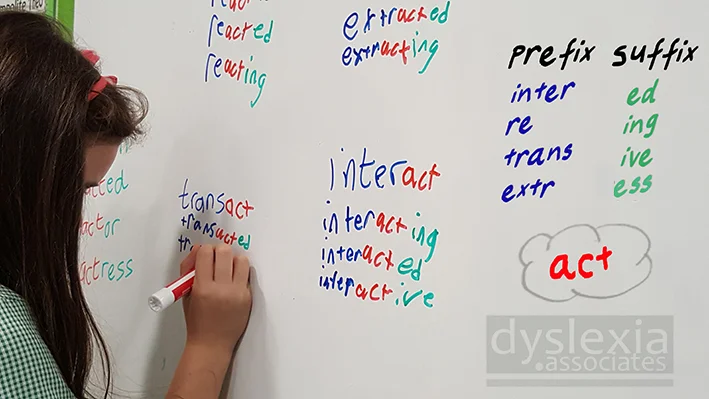Decoding longer words is challenging for dyslexic learners so it is essential to make learning visible and relate it to the personal experience of the individual. In decoding longer words the learner will also be exposed to a wider range of vocabulary, and vocabulary development for those with reading difficulties is a particular area for development.
“One study showed 20 root words and 14 prefixes, and knowing how to use them will unlock the meaning of over 100,000 words.
Another study showed that a set of 29 prefixes and 25 root words will give the meaning to over 125,000 words.”
Readers with dyslexia commonly experience difficulties in sequencing and holding units of sound in mind while they process the sounds to make the word. Therefore a systematic and cumulative programme that identifies the steps and discrete elements of word building will be more successful. Helping the individual to create a personal framework for understanding the meanings of root words, also referred to as base words, reduces the pressure on working memory and processing speed which is a characteristic of dyslexic type difficulties. In reading multi-syllable words, it can be common for the dyslexic learner to omit syllables leading to dysfluent reading and a slow reading speed which impacts on comprehension. Skills in word building and a working knowledge of common root words, prefixes and suffixes will improve reading fluency and spelling. It will also help improve the quality of independent writing as the individual gains confidence in using units of sound to spell unknown words, freeing them to concentrate on sentence structure and expression.
As a general rule, start from the known and build in success to activities, this will give the individual the confidence to 'give it a go' where they otherwise have learnt to give no response in situations where they are unsure of the correct answer.
In much the same way that sight words are treated as an essential cornerstone of fluent reading for emergent readers, the skills of word building using base word, prefix and suffix, likewise is a cornerstone of fluent reading in older age groups and stages. It is important both in pedagogy and andragogy to start from where the learner is and to use the familiar to structure learning so the learner can, in the first instance apply rules and then to generalise rules for word building.
Word investigation alone, may not give the dyslexic learner the specific teaching of vocabulary which needs to be developed through explicit teaching as part of a multisensory, cumulative programme.
Whilst younger learners may be fascinated by the idea that some of the English language comes from Greek and Latin, for other learners it can be an anathema! In a recent lesson with an adult learner, their response to this information was one of quizzical skepticism and complaint, "But no one speaks Latin any more!".
The root word act is a good starting point because all learners will be familiar with the root word act and will have some knowledge of a wide range of words using prefixes and suffixes. Use different coloured pens to help establish the steps in building words. This helps reinforce the prefix is before the root word and the suffix is at the end of the root word. Remember many dyslexic and dyspraxic learners have some difficulty with sequencing and left/right direction.
“A single Latin or Greek root word or affix (word pattern) can aid in the understanding (spelling and reading) of 20 or more words.”
The root word act means to 'drive', to 'do'.
Act: actual, active, activate, activity, actor, actress, activist, actually, attract, attractive, attraction, actualize, counteract, redact, deactivate, enact, interaction, radioactive, react, reaction, reactionary, reactive, inaction, reactionary, exact, character, characteristic, contractor, distract, impact, interact, interaction, manufacturer, practical, practically, practice, practitioner, transaction.
Whilst many will be unfamiliar with the meaning of the base word 'ject', they will have language experience with vocabulary using the root word 'ject'. From their knowledge of 'projector' they can gain an understanding of the meaning 'to throw'.
The root word ject means to 'throw'. Encourage the learner to create a mind picture to help remember the meaning of the word, and this will help with vocabulary development when working with the root words. It will also help access the meaning more efficiently. Common words for the base word 'ject': object, project, deject, adjective, subject, inject, trajectory, eject, conjecture, jettison, interject. Play around with prefixes and suffixes to see how many different words can be built.
The root word rupt means to 'burst'.
Rupt: bankrupt, bankruptcy, corrupt, corruption, incorruptible, abrupt, rupture, erupt, eruption, interrupt, interruption, disrupt, disruptive, abrupt, abruptly.
The root word port means to 'carry' and again is a common root word that the learner can generate lots of words and easily understand the meaning.
Port: transport, deport, support, portable, airport, passport, report, opportunity, teleport








